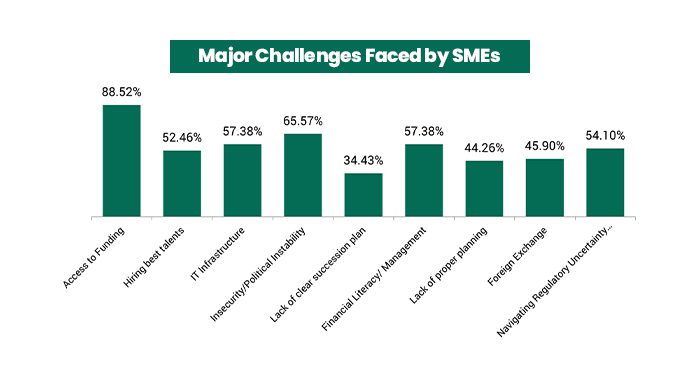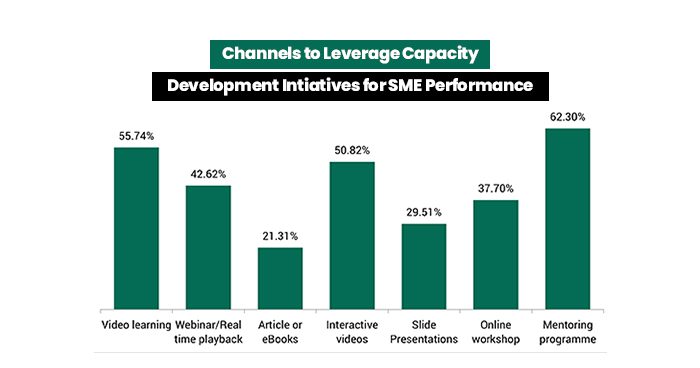Small and Medium Scale Enterprises (SMEs) are key economic players in resource allocation and industrialisation in developing and transition economies. They provide economic benefits, such as research and flexibility for economic change and human capital growth. Despite these benefits, one of the drawbacks inhibiting SMEs’ performance to business growth in Nigeria is capacity building. Other challenges include competitive interest rate, access to finance, business stability, financial literacy/ management, hiring the best talents etc. These undermine the growth potential and further affect SME contributions to the economy on a large scale.
SMEs are key sources of dynamism, innovation, and flexibility. Globally, they account for over 95% of enterprises, generating two-thirds of employment and are one of the major sources of new employment. According to the Nigeria Bureau of Statistics (NBS), the total number of MSMEs in 2017 was 41.5 million, comprising micro-enterprises – Medium Enterprises (MEs): 41.46 million (99.8%), small and medium enterprises (SMEs): 73,081 thousand (0.2%). In the Nigerian economy, SMEs have contributed about 48% of the national GDP in the last five years, with about 17.4 million accounting for about 50% of industrial jobs and nearly 90% of the manufacturing sector.
SMEs Performance and Capacity Building
Capacity building has several meanings based on the context of use. In this perspective as regards SMEs, capacity building can be interpreted as utilising initiatives to help small enterprises grow; it may be through learning, acquiring skills, talent development or accessing capital. Developing SMEs’ capacity is essential as it plays an integral role in 4 key areas; operational, management, financial management and personal (talent) development to fulfil great business success for SMEs.
At the core of capacity building is the need to provide the required tools for developing business sustainability. With the impact of COVID on business performance, innovation has become a necessity for all existing small-medium enterprises that will survive COVID realities.
In a recent survey carried out by pcl. on SMEs Capacity Development, results show that SMEs face several challenges such as access to funding, hiring best talents, lack of Insecurity, succession plans, foreign exchange, lack of appropriate planning and IT infrastructure etc. Below is an outlook on the challenges SMEs current face:
Source: pcl. SMEs Capacity Development Survey
Despite these challenges, given that SMEs contribute 48% to the national GDP, growth for SMEs will put Nigeria on an accelerated growth trajectory. Indeed, this speculates that SMEs need to seek to expand capacity through SME targeted initiatives such as mentorship, masterclass programmes, and interactive learning opportunities via e-learning programs.
To further promote sustainability for small businesses and startups and facilitate companies to modernise and expand, the government must play an integral role by setting up an environment and policy framework in which new and small firms may operate. There on, successful initiatives will thrive by the following:
- Access to finance through alternative financing through leasing, factoring, private equity, venture capital and business angel financing, peer-to-peer lending, equity crowdfunding, blockchain-based financing, and trade finance.
- Support SME development through curating infrastructure development strategies.
- Enhance the conversion of informal entrepreneurship into formal businesses via reviewing business registration procedures.
- Provide growth and innovation support for SMEs.
- Collaborate with SMEs to institutionalise capacity building workshops for SMEs.
The adverse effect of COVID has impeded the growth of SMEs in developing economies. On the African landscape, SMEs can leverage growth opportunities to sustain their businesses in the post-COVID-19 pandemic era as they reinvent their business models. A vivid example is the Know2Grow campaign in Namibia targeted at MSMEs with the government as a key stakeholder. The government was able to address the challenges affecting MSMSE via the campaign. Know2Grow is a regional knowledge dissemination, capacity building, and networking initiative that endeavoured to provide MSMEs with critical information, including business scalability, gaining domestic and international market access. This initiative provided MSMEs with the required support in terms of access to funding, mentorship and training programmes and facilitating market access for locally produced products.
How SMEs can leverage Capacity Building for Performance
It is imperative that SMEs collectively gravitate towards utilising digital tools to build capacity, transform, and equip themselves in navigating new realities to achieve set goals now and beyond. With digitalisation as a key driver for growth across global entities, digital learning is fast becoming the new wave for SMEs to close knowledge gaps and reimagine value creation post-COVID.
To further promote capacity building to improve SME performance, and promote sustainability for small business enterprises and startups, founders and small business owners should leverage on capacity development initiative to improve SME performance by:
- Addressing skill bottlenecks via mentorship, masterclass programmes, interactive learning opportunities via e-learning programs.
- Managing supply chain challenges for transport & logistics enterprises
- Building agile strategies & frameworks for business sustainability
- Leveraging existing or new technologies to ensure unified integration of business systems.
- Equipping team/employees with accurate data insights from clients or customer feedback to promote business growth.
Below is an outlook on various channels through which these initiatives can be conveyed:
Source: SMEs Capacity Development Survey
How pcl. can support
We have a track record of strategic partnerships with private and government agencies to deploy capacity development workshops and initiatives via our practice areas in digital transformation, business strategy, human capital development and technology transformation. Our team has industry-valued experience supporting SMEs in navigating through challenges and bottlenecks.
Written by:
Olayide Eleso
Analyst


